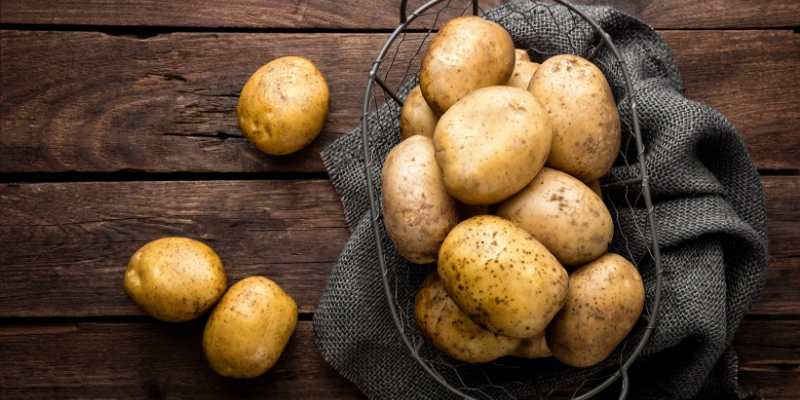First of all, thank you so much for clicking through and being on this page! I’ll do my best to deliver all the content you might expect to find and answer all the possible related questions.
Your time is super important, so let me quickly explain what is covered in this guide and how to navigate it.
In the research below, l cover everything about potatoes and dogs. Whether it’s sweet or regular, raw, boiled, backed. When it’s getting toxic and what to do if your pup overate it. I also touch on the topic of a potential connection between this veggie and cardiac diseases in canines. And reveal the best potato dog food options currently available.
You can use the table of contents below to quickly jump to the section you want to start with right away. And you can go back to the beginning by clicking the circled arrow in the right lower corner.
I put 20 hours of research in this report, so I really hope it will be helpful.
Are potatoes good for dogs?
Gluten-free and grain dog foods are getting momentum over the past decade as a means to fight allergies. So, potatoes became an obvious wide-spread carbohydrate source to substitute barley, rice, and oats. It’s easily digested and loved by many pups. And also a reliable source of various nutrients, like Potassium, Vitamins A, B, C, etc.
Some dogs may dislike this veggie and turn their noses off potato-based formulas. But most will eat it, enjoy it and receive nutritional benefits from it. But let’s use scientific evidence to get to the nitty-gritty of dogs eating potatoes.

Are potatoes safe for dogs?
Not so long ago the U.S. Food and Drug Administration (FDA) published an alert about reports of canine dilated cardiomyopathy (DCM) in canines consuming pet foods with lentils, peas, other legumes, or potatoes as main ingredients. This condition DCM leads to increased heart size along with reduced pumping, that in the worst-case scenario might result in congestive heart failure or sudden cardiac death.
There was a lot of fuss about it, but what the statement was saying is that taurine deficiency leads to the condition, not potatoes itself.
There was this excellent research on the topic also measuring taurine amounts in various types of food. The primary source of Taurine is meat, not legumes or potatoes.
And by the way, rice or barley don’t contain Taurine either. So with the same level of accuracy, the scandalous headlines easily could be “Rice leads to death in canines” or something similar.
The point is potatoes are cheaper than meat. Imagine 100% meat dog food, that might be really costly. Naturally, dog food manufacturers mix all the ingredients to create the formulas that meet all nutritional requirements of your pup.
The key is to find a reliable brand that creates potato-based food fortified with Taurine, and you will always be on the safe side. (We will cover the options later in this article, so bear with me).

Can dog ever have potato poisoning?
Let’s remind ourselves that potatoes are a part of nightshades plants family (along with bell peppers, tomatoes, and eggplants). That means that there are a VAST variety of toxins naturally occurring in this vegetable.
There is Oxalic acid (oxalate) that can bind Calcium and other nutrients. So they become insoluble, and their bioavailability will decrease. Consuming foods with high concentrations of oxalates may affect bone growth, lead to kidney stones, and more dangerous conditions.
There’s also a glycoalkaloid called α-Solanine, and it can be pretty dangerous. There are known cases of canine intoxication by it. And it’s also proven to be embryotoxic.
Don’t worry too much, though. The possibility of you or your pup being intoxicated by glycoalkaloids from potatoes is quite low.
The average consumption of glycoalkaloids by potato-eaters is 12.75 mg per day. That was established by the National Institute of Environmental Health Sciences back in 1993. And it’s as low as 20% of the lowest dose that might get toxic to humans (which is 1 mg per kg or person’s weight).
Cooking also decreases the levels of the poisonous compounds in potatoes. So keep an eye on serving sizes and make sure not to give your pup raw vegetable and you both are going to be okay.

Dogs and potatoes: raw, cooked, boiled …
Can dogs eat potato chips?
According to the USDA (United States Department of Agriculture) Food Database, the 100g serving of plain unsalted potato chips contains 536 calories, 7g of protein, 52.9g of carbs, including 4.8g of fiber and 34.6g of fat, including 10.96g of saturated fats.
On top of that, it has some vitamins and minerals: 24mg of Calcium, 67mg of Magnesium, 1275mg of Potassium, 31.1mg of Vitamin C, B6, Niacin, Riboflavin, Folate and more.
I don’t know about you, but for me those stats were eye-opening. I previously mentally listed potato chips as evil. But apparently, it has some good to it.
I wouldn’t think of sharing potato chips with my pup as a good idea.
Bad fats, high calories, high Sodium, and high Potassium doesn’t seem like a healthy choice for canines.
Potassium is a crucial electrolyte for pups health. It helps to sustain healthy brain function and the nervous system. However, too much might be not so great and cause hyperkalemia. The condition described by a higher level of Potassium in pup’s bloodstream. Severe hyperkalemia is usually associated with lethargy, depression, cardiac arrhythmias, and more quite as unpleasant things.
Just FYI, if you are as curious as I am, high potassium concentration is more than 7 mmol per blood liter.
And for instance, if you want to lower that number, you’ll have to put your pup on a diet restricting potassium consumption. Decent potassium levels, in this case, will be approximately 1.5g per 1,000 calories of food. Potato chips have about 2g of Potassium per 1,000 calories. And that’s quite a lot.
So, I’d say no to potato chips for many reasons.
And how about french fries? Or baked potatoes?
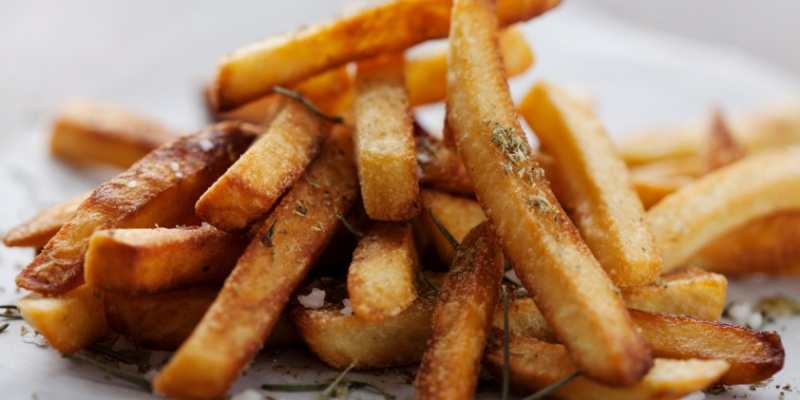
100g serving of your ordinary Denny’s french fries contains 282 calories, 3.41g of protein, 35.20g of carbs, including 3.5g of fiber, and 14.13g of fat, including 2.5g of saturated and 0.12g trans fats. It also has some vitamins and minerals: 14mg of Calcium, 27mg of Magnesium, 492mg of Potassium, Vitamins C, B6, E, K, Niacin, Riboflavin, and more. It also has less Sodium – just 44 mg per 100g serving.
Although it seems like a safer option for your pup, I have another research for you.
If you cook potatoes at high temperatures ( greater than 120 °C (248 °F), you might often find the toxin called Acrylamide in it. It’s mutagenic (causing various mutations). And demonstrated to be neurotoxicant, reproductive toxicant, and carcinogen. It also classified by the International Agency for Research on Cancer (IARC) as a probable human carcinogen.
It means that starch-based potato baked, as chips or fries, should be avoided. Both by you and your pet.
Can dogs eat mashed potatoes?
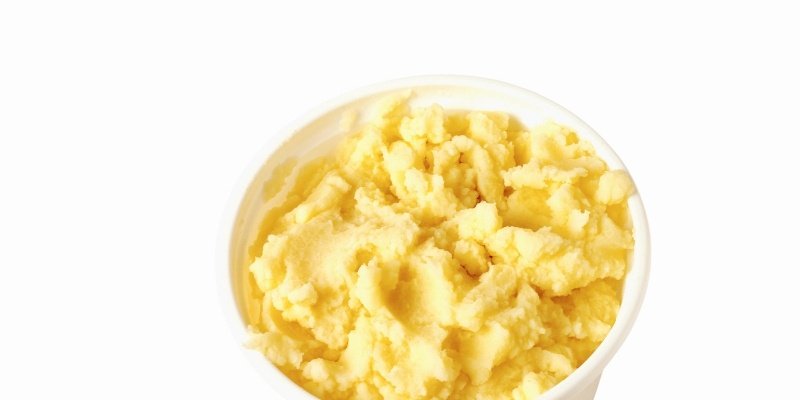
You should certainly not let your pup eating mashed potatoes if it contains milk, sour cream, or other dairies. Unfortunately, this will cross out most of the mashed potatoes recipes that we humans are appreciating.
Yes, mashed potatoes made of boiled produce. And it’s the only proper way to cook it to decrease the number of various toxins whether it’s Acrylamide or Solanine. But there are still some questions marks about this dish. We have the proper guide covering “Can dogs eat mashed potatoes?” topic, so you can jump in for more details on that.
Are raw potatoes bad for dogs?
Never give your dog a raw potato. It contains toxic oxalate and solanine, as we’ve covered earlier. Cooking a potato reduces its levels.
If you feed your dog a potato, it should be boiled with nothing added to it. And, of course, served in small portions.
Can dogs eat potato skins?
Potato skins have the highest concentration of Oxalic acid (oxalate) that can bind various minerals, like Calcium and making them insoluble. Ingesting too much of potato skins potentially can cause conditions like kidney stones, decreased bone growth, and more. So, your pup should avoid potato skins and raw potatoes in general at all costs.
My dog ate a raw potato. What should I do next?
Talk to your vet if your dog has eaten generous amounts of seasoned or raw potatoes. Your veterinarian will need to know how much your pup ate, and how long ago it happened. You should also let the doctor know what symptoms you have seen if any. So monitor your dog after feeding them (or they feeding themselves with) any new food item, (raw potatoes included) for signs of intestinal upset or allergic reactions.

So is it OK for a dog to eat a potato?
Overall, potatoes are OK for healthy canines, as long as they are boiled to keep the naturally occurring toxins levels at a minimum. Of course, all dogs are unique and respond differently to various foods.
So, when you try to give him or her new food, it’s better to watch pup’s bowel movements, energy levels, behavior, etc. And if you spotted something troubling or unusual, you have to talk to your vet. And keep an eye on the serving size. It has to be small.

Can dogs eat sweet potatoes: raw, boiled, fried?
Can dogs have raw sweet potatoes?
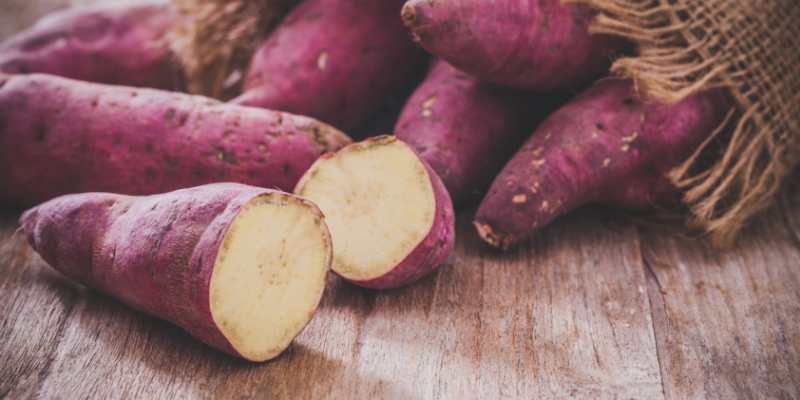
100g serving of sweet potatoes contains 85 calories, 1.69g of protein, 20.34g of carbs, including 3.4g of fiber, and 4.24g of sugar. It also has some vitamins and minerals: 30mg of Calcium and 0.85mg of Iron. It also contains relatively small (but still high for pups) amount of Sodium – just 55 mg per 100g serving.
Sounds quite good. But with the caveat. Sweet potatoes, just as the ordinary potatoes are high in oxalates. Kidney stones can be different. But 8 out of 10 are calcium oxalate type. They may occur if there excess of oxalate and lack of liquid in the pups’ urine.
So, your pup would probably have to avoid the raw sweet potato as well.
Can dogs eat sweet potato fries?
As per USDA Food Database, the 100g serving of sweet potato fries contains 179 calories, 1.19g of protein, 28.57g of carbs, including 3.6g of fiber, and 5.95g of fat, including 0.6g of saturated ones. And some vitamins and minerals: 24mg of Calcium, 286mg of Potassium, 5.7mg of Vitamin C, and 3571 IU of Vitamin A. High in Sodium – 202mg per 100g serving.
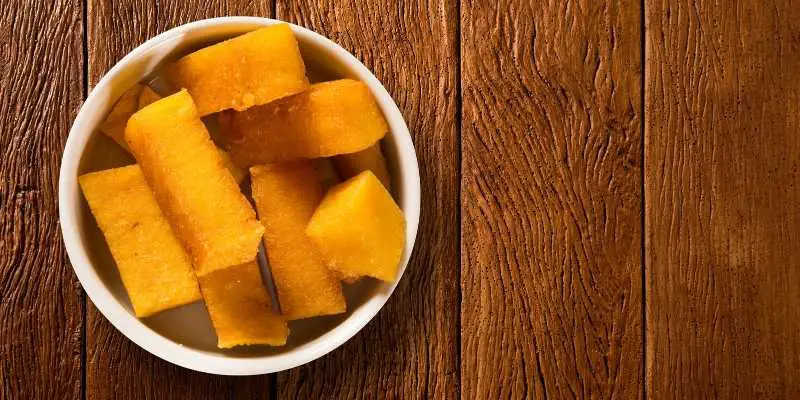
The nutritional value seems terrific. Especially eye-popping amounts of Vitamin A. That it’s known to beautify pups’ skin and coat, help in sustaining the health of muscle tissues and nervous system.
Although still not clear if 3571 IU of Vitamin A in 100g of food is too much (which can be toxic).
As per the Association of American Feed Control Officials (AAFCO) adult dog food has to provide 5000 IU of Vitamin A per kilogram of food. It’s more than 35000 In sweet potato fries’ case.
But let’s put vitamin A riddle aside. Fried sweet potatoes might also have that cancerogenic Acrylamide. And even in larger quantities than your ordinary potato.
I would have passed on sweet potato fries.

Are sweet potatoes good for dogs, after all?
Sweet potatoes are starchy vegetables providing various nutritional benefits. They are rich in vitamin A, which is responsible for healthy skin, coat, muscle tissues, and other goods in dogs. It also is a powerful antioxidant that helps prevent disease and infection.
The best way to add this vegetable to your dog’s diet is to steam or boil it. Thus you’ll keep the number of potentially dangerous toxins at a minimum and preserve the nutrients. Do not add any seasonings to the treat though. And remember, feed only the smallest amount first. Between a teaspoon or a tablespoon, depending on the breed’s size.
Or better yet stick with potato-based dog food. It’s formulated with all pup’s nutritional needs in mind, combating all the possible cons of eating this vegetable.
And at the very worst-case scenario (I am talking extremes here) you can always file a complaint or go to court if something goes wrong. No way you’ll be able to do it when cooking yourself.

Potatoes in dog food
Are potatoes a grain?
Potatoes fall into the starchy vegetable category alongside green peas and corn. So it can be a great alternative to bread, pasta, rice, or other grains. It’s a staple of a popular grain-free dogs’ diet, which some pet owners prefer to deal with various allergies.
As we’ve mentioned earlier in this research, the significant potential downside of potato-based (or legume-based, or grain-based as a matter of fact) dog diet is a taurine deficiency. It can lead to various heart issues. So it’s always a good idea to check if the product fortified with Taurine. And we’ve got you covered on that.
This potato and duck grain-free formula promotes pups health on all fronts as it fortified with all sorts of vitamins, Taurine included. It’s perfect for dogs with sensitive stomachs or allergies (it’s limited ingredients formula with the protein that is not known as a common allergen – the duck).
It’s not cheap, but also not as overpriced as many RX food options serving the same purpose. So if your pup struggles with skin issues or digestion problems you might want to give it a try.
You can check more reviews and buyers’ shared experience with this product .
Another phenomenal option for dogs with various sensitivities and allergies. Nutro sweet potato recipe is also grain-free, limited ingredient formula. The main protein is venison, and it also includes tons of vitamins, Taurine included. If your pup is allergic to salmon, chicken, corn, or other grains, this can be your savior. It smells very strongly (and not great for the human’s taste). But dogs like it!
The only downside is that the largest bag is only 22 pounds and since most dogs reportedly enjoy it, the food doesn’t last long. However, If you are looking for quality, this is a good one.
You can check more reviews and buyers’ shared experience with this product .
Awesome sweet potato dog treats, made with nothing more than just… SWEET POTATO.
It’s dehydrated, so there are no toxic compounds that might have been evolved during the cooking process. Your pup will feel like he or she is eating real human food. Such a fun twist on dog treats. You can stuff in the top of a filled for some added crunch.
And they are also great as a food topper as they are easily broken into smaller bite-size pieces. Great little find!
You can check more reviews and buyers’ shared experience with this product .
This human grade organic sweet potato biscuits can be used as special treats for picky pups with finicky digestive systems. Unlike many common store brands, these treats always smell fresh upon arrival, like baked goods. And the treat is made of natural organic ingredients that meet nutritional needs without added synthetic supplements or vitamins.
If your pup is allergic to beef or chicken, you know that it’s challenging to find an exciting dog treats without those ingredients. These biscuits can be a solution.
You can check more reviews and buyers’ shared experience with this product .
This healthy one Ingredient treat made from100% dehydrated sweet potatoes grown & dried in the USA. It’s high in fiber, so promotes healthy digestion, and the rough edges can help clean your dog’s teeth. No chemicals or artificial anything, one ingredient, and seem to be tasty as pups are going crazy over this one.
The price is a little high, but the quality is worth it. You can break them to size for smaller dogs, so the product will last longer. An awesome option for health-conscious responsible pup owners who are looking for fresh treat ideas.
You can check more reviews and buyers’ shared experience with this product .
Thanks for the blog graphics: Canva.com

